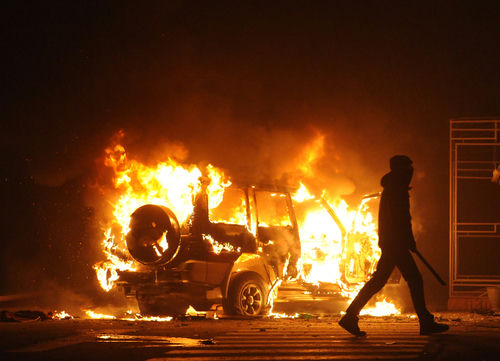As assaults on federal immigration officers skyrocket, an arson attack on a Yakima ICE office exposes the dangerous consequences of anti-enforcement rhetoric and lax sanctuary policies.
Arson Attack at Yakima ICE Office Amid Escalating Hostility
On August 2, 2025, an unidentified individual threw a rock through a window at the Immigration and Customs Enforcement (ICE) field office in Yakima, Washington, before setting a fire at the property’s rear. Local firefighters responded swiftly, arriving within minutes and extinguishing the blaze before it caused structural damage. Although no injuries were reported, the incident is being investigated as arson by local authorities and the Department of Homeland Security (DHS). This attack occurred in the context of an 830% surge in assaults on ICE officers in 2025 compared with the previous year, signaling an alarming escalation in violence directed at federal law enforcement.
DHS officials have directly linked the rise in attacks to what they describe as “violent rhetoric” from sanctuary jurisdiction leaders and certain national political figures. Federal authorities argue that the vilification and demonization of ICE, especially in states like Washington that embrace sanctuary policies, have emboldened individuals and groups to target officers and facilities. This incident occurred in a region with a history of local resistance to federal immigration enforcement, and the Yakima ICE office is situated in a complex that also houses state social and health services, further intensifying local political tensions.
Sanctuary Policies and Federal-State Tensions Under the Spotlight
Washington state’s longstanding sanctuary policies, which limit cooperation with federal immigration enforcement, have been sharply criticized by members of Congress and DHS leadership. In April 2025, House Judiciary Chairman Jim Jordan questioned Washington officials about their approach, and now, in the wake of the Yakima attack, calls are growing for state and local governments to fully cooperate with ICE. The Trump administration has made it clear that localities refusing to assist federal agents could face funding cuts and legal consequences. This policy shift is part of a broader federal effort to prioritize immigration enforcement and restore law and order after years of what many see as dangerous leniency.
ICE and DHS have yet to confirm whether the Yakima office or its personnel were the intended targets, but the attack fits a nationwide pattern of assaults and protests at ICE facilities. The event has prompted outcry from conservative lawmakers, including U.S. Rep. Dan Newhouse, who condemned the violence and demanded additional resources for law enforcement to protect federal employees. Law enforcement experts warn that ongoing political polarization, amplified by anti-ICE rhetoric, increases the risk of further incidents and undermines the safety of officers tasked with upholding the law.
Political and Social Ramifications for Immigration Enforcement
The attack in Yakima has reignited national debate over the consequences of sanctuary policies and the broader climate surrounding immigration enforcement. In the short term, federal and regional authorities are enhancing security at ICE and other government facilities, while the public and media focus intensifies on the safety of law enforcement personnel. Long-term, the incident is likely to drive renewed scrutiny of sanctuary jurisdictions and push for stricter cooperation with federal agencies. These developments come as the Trump administration’s new policies aim to increase deportations, expand detention capacity, and penalize states that fail to support federal immigration initiatives, reflecting a fundamental shift away from the previous administration’s approach.
Communities across the country are now grappling with the fallout from these policy changes and the social tensions they create. Supporters of strong immigration enforcement argue that protecting officers and upholding the rule of law are non-negotiable priorities, especially when government rhetoric or policy emboldens criminal behavior. Critics of aggressive enforcement, meanwhile, claim such actions provoke backlash and community unrest. However, the overwhelming consensus among federal law enforcement and conservative policymakers is that attacks like the one in Yakima are a direct result of undermining ICE’s authority and must be met with robust action to restore order and safeguard those who defend America’s borders and laws.
DHS: Arsonist Attacked Washington ICE Field Officehttps://t.co/MeQZCVWoy5
— Michael (@CrimpedPrimer) August 7, 2025
While the investigation into the Yakima arson attack remains ongoing, federal and local leaders are united in their condemnation of the assault and in their commitment to pursuing justice. This incident serves as a stark reminder of the real-world consequences when political rhetoric crosses the line into hostility against law enforcement, and it highlights the urgent need for policies that respect the rule of law, protect federal officers, and put the safety of American communities first.
Sources:
The Independent: ICE arson attack in Yakima, Washington
Spokesman-Review: Rock thrown into ICE office in Yakima with fire extinguished quickly
Fox News: ‘Cowardly rioter’ threw rock, set fire at ICE sub-office in Washington state: DHS

